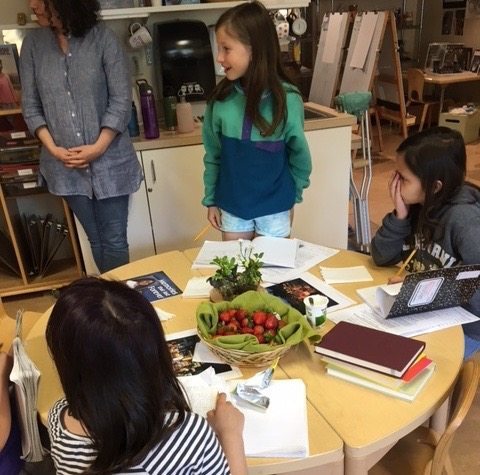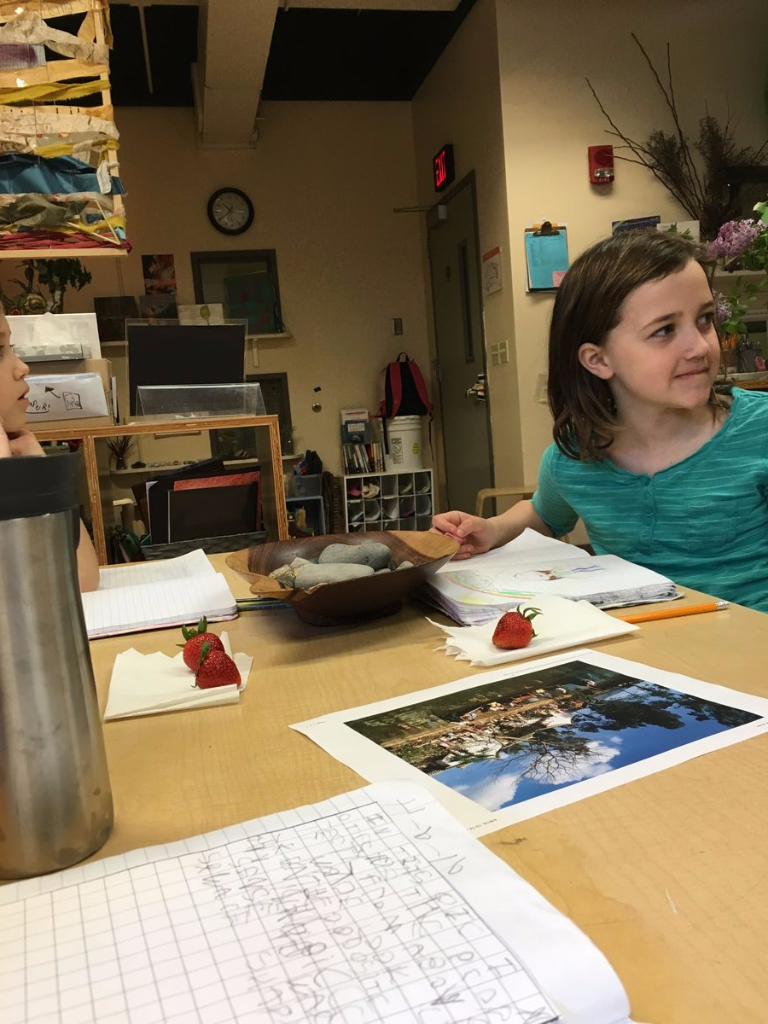In the spring, because our third graders had become so engaged with statistics of our global population, we decided to share some of the Material World photography collection with them. This powerful project documents the disparity in material possessions around the world. Here is a sampling:
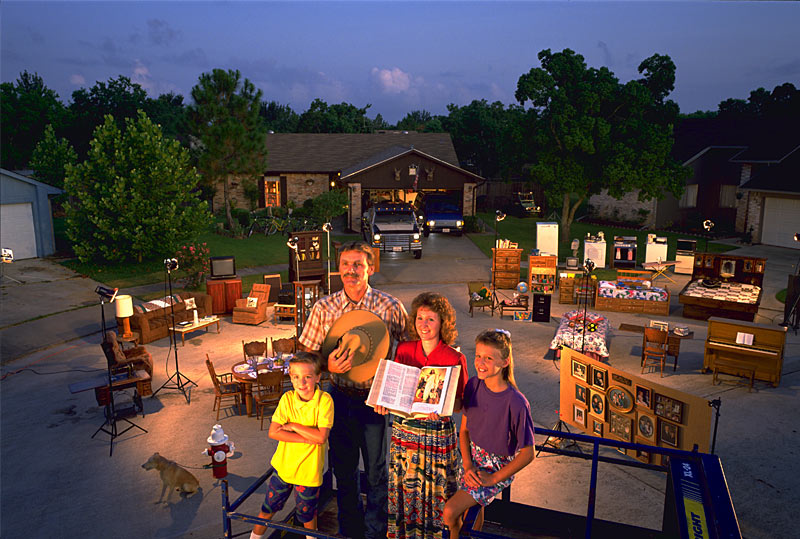
COPYRIGHT:© 1994 Peter Menzel www.menzelphoto.com Material World
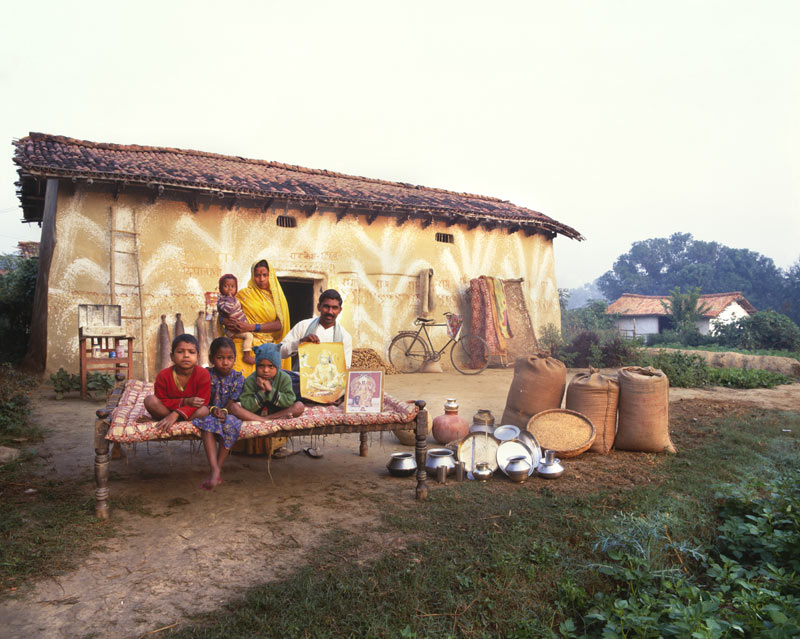
Photograph © 2004 Peter Ginter
I asked the children why they thought that this book was created. What did the author intend? The overwhelming majority of the children said it was created to help them feel fortunate.This really surprised me! I thought there would be at least a hint of recognition that the book might be intended to raise awareness about inequity and motivate concern. But there was none. I probed a little further but their perspective was unshakable. I was concerned that because this position was so steadfast and naive, if I challenged too much in that moment, I might succeed in shifting the language they were using, but not their understanding. So I wondered, how can I make them feel something? Times like these always make me think of the famous Blue Eyes, Brown Eyes experiment. I found a possibility in the strawberries that were just arriving in our local stores.
The next day, I created a large, beautiful basket of fresh strawberries and placed some of the photos from Material World on their tables, intentionally separating the photos on each table group according to varying degrees of material wealth. When the children were seated at their tables, I let them know that I had prepared a treat for them, and began distributing the strawberries with amounts that loosely reflected the material wealth in the photos on their tables. I put one strawberry on one table, 2 at another, none at one table, and all the rest including the lovely basket on the last table.
It only took a moment for SM to yell out: Hey, that’s not fair!
She was right, of course.
RM held up one of the photographs and said, “Look at all this stuff!” They had noticed the relationship between their strawberries and the photos. We talked about how it felt to be able to see that others didn’t have as much as you did.
GB: When I look around, I feel like I’m taking them from the other people
Teacher: I did say ‘this table gets more’.
LR: And that’s not fair!
SM: When you gave the whole basket to them, I felt sad.
I asked them to write for a bit in their writer’s notebooks about what they were experiencing just then.
And then I let them know that they were free to enjoy their strawberries. There was a brief hesitation as this sunk in. Then RR, who had two strawberries at her table, which she shared with three others, took one of their strawberries over to the table that had none.
I looked over at the table that had the full basket and asked them: You’re feeling fortunate, right?
SE: and guilty.
OR makes the connection: They (the photographers) also want you to feel how unfortunate others are and they might not get what they need.
SM: It wouldn’t be fair because they can’t see us. We are in a different country. We live in Africa (holding up a photograph). Where do you live?
SE: Japan and the US.
SM: They have water and food. We couldn’t really see that it isn’t fair, because we can’t see them, unless we read the paper or something.
SE makes another connection: Like slaves. they would get treated in such horrible ways: whipped, killed. It’s like they had nothing and we are being so greedy. We actually killed them. I don’t know why.
And I decided to enter this difficult terrain: In times in this country’s history when African Americans were enslaved, they often lived in shacks next to huge plantation houses. Before eating, maybe the plantation owners would say to themselves, “I’m so grateful I’m not one of them, living other there, in the shack.” What’s wrong with that?
RM’s response surprised me. She said: It’s ok. They are feeling sorry for them.
EC: I’m thankful I’m not one of them…
GB: They are the same people almost, just have different melanin in their skin. They might be thankful they don’t need to do the work, but they are the same people, just with more active melanin.
AB: If the strawberries are homes, food, water, it’s just on a smaller scale– it’s just torture to see that table with no strawberries and we have so much. It feels bad, I want to split them equally so everyone gets equal amounts. But it’s not how people are handling it.
EC: It reminds me of the Declaration of Independence. Ben Franklin wrote it– he felt sorry for slaves, he wanted them to be free, but he also owned slaves. He thought the country wasn’t ready to give them up. I think the earlier we gave them up it would be better.
What happens when children experience dialogue in their classroom as a daily practice is that they bring what they know — perhaps what is partially understood — perhaps what troubles them, into their communities for help making sense. All these disparate pieces of the world, we all try, all the time to consolidate into patterns we can make sense of. When children begin to see their classroom as a place where that can happen, they practice habits of mind that strengthen them in times of struggle, disequilibrium and uncertainty. And when children feel comfortable bringing these pieces of the world to the fore, we have an opportunity to observe misconception, and over time, make plans for correction. RM pulls another thread:
RM: If we split it equally, it’s not good, there would be no conflict.
Here, RM is grappling with an idea we’ve been considering all year, that is, that conflict is a necessary part of idea making and community building. She is aware there is a paradox here, and others push back, helping to make more sense of a complex subject. I am listening, but I don’t need to intervene.
EC: But we’ve had conflict.
AB: Plenty of it.
Then SE introduces a new idea: Charities! It helps people in like Kenya — and back then, people were really against African Americans, one day Martin Luther King gave a speech…
I want to confirm and encourage their continued thinking and theory building so I affirm:
Teacher: It’s all a part of the story, its all connected.
LR: I feel the opposite. You were saying, that they felt sorry for them, but they are glad they are not them. I feel sorry for [the rich] because they are greedy.
DP: If I was them I wouldn’t want to sit around and think about how others have none…
Picking up on SE’s suggestion, I tell them: I would like to act as your charity organization, and I am going to give them a donation.
RM announces: We aren’t eating any. But we are saving them for later. We may need them.
In response to RM’s comment, I offer one extra strawberry to each of the other tables and return the almost full basket to it’s original table.
SM: It’s still not fair!
Teacher: But they gave you a donation…
OR: They have a lot, and now we can match with that group (pointing to another table), they have way more than us, but one group still has two berries…
AZ: I remember last week you showed us that the richest take more than 1/2 of all the money.
RM: We need to keep some, too.
AB: We have plenty.
OR: They have what they need. But we don’t.
SE: You have one for each of you.
I ask the table with the most: Is it a big problem for you if you choose to keep the whole basket?
GB: I think it’s a problem. I have the food that I can eat, I am giving a teeny bit, It makes me sad because, they are people, just like us…
I ask a different table: Is it a problem for you if they keep the rest? And the children at that table hesitate to respond. So I say: OK, let’s see what happens. You gave a donation, so you may eat your strawberries now…
And then the room erupts. That’s not fair!! One child even storms out of the room.
So I ask: Hmm — is it working out?
I look down and DP has decided to crawl across the floor, planning to steal from the basket on the other table. And I make a suggestion: Look at what is happening…
SM: This is what makes the war!
As the emotion is heightened, I ask them to return to their writer’s notebooks. AB writes: It feels TERRIBLE to have all the strawberries! I mean, it makes me feel more fortunate, but it makes me feel really bad. Even though I didn’t ask for all of the strawberries, it still makes me mad. It’s torture seeing another table have none! People are trying to steal and that’s what starts wars!
SM: We could have a protest, we can fight back, or kill. Those are the 3 choices.
OR: I think that if we want to use empathy we can think about how they have 2, 1, or none.
Teacher: And we’ve said we can give a donation. I can understand using sympathy, but empathy is different. If I am using empathy, what might that mean that I am doing? Which group can use empathy? Who has the power?
LR: They might be feeling sad for us,
Teacher: And you have to solve the problem based on what you’d need if you were feeling that way
LR: It’s feeling their feelings, when you feel their feelings, you can feel how they felt. If there are other greedy people, you might want them to give them —
Teacher: DP said empathy is a tool …
GB: You have to know how both sides feel, you think about what it would be like to have all the strawberries —
Teacher: so when you get to have an equal amount, how will you be feeling? Is it fair?
RM: We don’t want to give you any, because you are stealing. (She looks at DP and SM who are creeping towards them.)
Teacher: RM brought up another point; people need to behave themselves.
RM: Because if they start doing something to us…
Teacher: So it looks like we have one last decision to make….before we distribute the strawberries…does everyone who is about to get strawberries have to behave?
DP: I have one of the India things (points to forehead) —
Teacher: You might look different than the people with the strawberries. Do you need to change the way you look?
EC: If each table was a different family…
Teacher: This table has control and so they are deciding if they share or not. It sounds like they’re saying that if a group is bad and wrong, you won’t give them any, will that work out for you?
Ultimately, the children decided that sharing the strawberries evenly would be the right thing to do. And what I thought would be a quick and easy exercise turned into an experience that lasted over an hour. The issues of charity and control were unexpected to me. I didn’t foresee that the children would spontaneously try to steal from one another, and that they whole experience of privilege and power would play out with real emotion right in the midst of literacy studio.
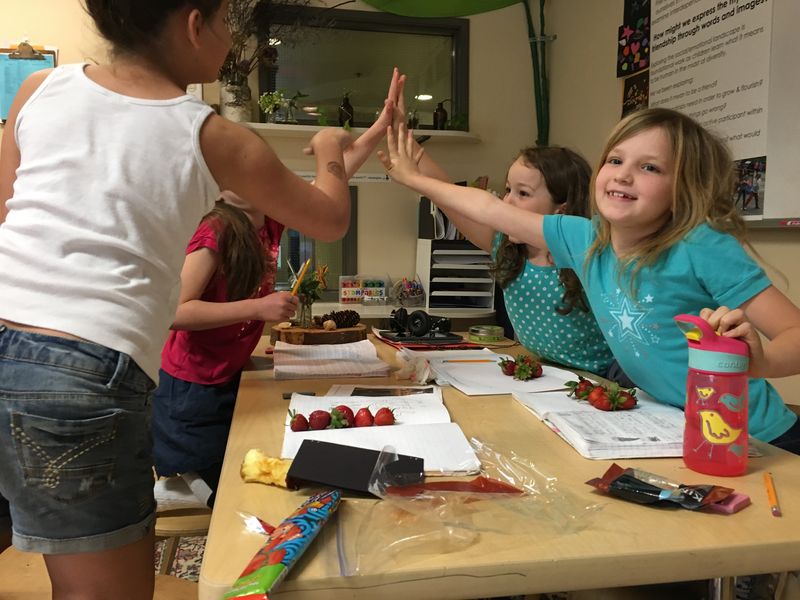
The experience served as a reference point for the rest of the year. Just about two weeks later, as we were watching a video about a child who lives in a Syrian refugee camp DP said: I’m feeling really weird. When I had fewer strawberries, I mean I know how she feels. But what we were doing was pretend.” Left unspoken but rippling through the room, was a moment of recognition. What do you do when you have all the strawberries? These children are beginning to understand that in so many ways, they do. Understanding that by choosing empathy, all our own lives get better, is a complex abstraction most of the time. This playful experience with strawberries helped put it in their hands, and having touched it, they’ll remember how it feels. When they remember how it feels, they’ll have access to it going forward.
